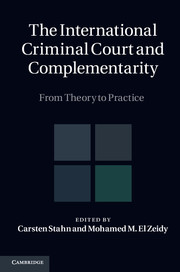Book contents
- Frontmatter
- Contents
- Acknowledgments
- Foreword by HE Judge Sang-Hyun Song
- Foreword by Patricia O’Brien
- Foreword by Silvia A. Fernandez de Gurmendi
- List of abbreviations
- Introduction: bridge over troubled waters?
- PART I General reflections
- PART II Origin and genesis of complementarity
- PART III Analytical dimensions of complementarity
- PART IV Interpretation and application
- 14 The application of the principle of complementarity to the decision of where to open an investigation
- 15 Situation and case: defining the parameters
- 16 The inaction controversy
- 17 The admissibility procedures
- 18 The evolution of the ICC jurisprudence on admissibility
- 19 Interpretative gravity under the Rome Statute
- 20 Complementarity and burden allocation
- PART IV (Continued) Interpretation and application
- PART V Complementarity in perspective
- PART VI Complementarity in practice
- Index
- References
19 - Interpretative gravity under the Rome Statute
Identifying common gravity criteria
from PART IV - Interpretation and application
Published online by Cambridge University Press: 05 November 2014
- Frontmatter
- Contents
- Acknowledgments
- Foreword by HE Judge Sang-Hyun Song
- Foreword by Patricia O’Brien
- Foreword by Silvia A. Fernandez de Gurmendi
- List of abbreviations
- Introduction: bridge over troubled waters?
- PART I General reflections
- PART II Origin and genesis of complementarity
- PART III Analytical dimensions of complementarity
- PART IV Interpretation and application
- 14 The application of the principle of complementarity to the decision of where to open an investigation
- 15 Situation and case: defining the parameters
- 16 The inaction controversy
- 17 The admissibility procedures
- 18 The evolution of the ICC jurisprudence on admissibility
- 19 Interpretative gravity under the Rome Statute
- 20 Complementarity and burden allocation
- PART IV (Continued) Interpretation and application
- PART V Complementarity in perspective
- PART VI Complementarity in practice
- Index
- References
Summary
The notion of gravity under the Rome Statute of the International Criminal Court (ICC) is very complex. Articles 53 and 17 of the Rome Statute provide for a complicated corset that allows the Prosecutor to exercise prosecutorial selection. One essential part of this selection process is the application of the gravity requirement. This chapter shows that neither the Office of the Prosecutor (OTP) nor the Chambers have developed a congruent gravity approach. They address certain aspects of the prong ‘gravity’ but fail to arrive at an all-embracing interpretative approach.
In his survey, the author commences with an interpretation of the gravity notion as such and, in a second step, he tries to arrive at common criteria for gravity. From the author's point of view, the notion of gravity entails four different facets: a legal gravity threshold with regard to situations and cases, linked to Articles 53(1)(b) and 17(1)(d) and Articles 53(2)(b) and 17(1)(d) of the Rome Statute, and a relative (discretionary) gravity assessment with regard to situations and cases, linked to Article 53(1)(c) and (2)(c) of the Statute.
The concepts of ‘legal’ an‘relative’ gravity allow for a better distinction of legal and policy criteria. While a mixed quantitative-qualitative perception is (generally speaking) favourable as a common gravity basis, the differentiation of ‘legal’ and ‘relative’ gravity leads to a more nuanced approach.
- Type
- Chapter
- Information
- The International Criminal Court and ComplementarityFrom Theory to Practice, pp. 603 - 641Publisher: Cambridge University PressPrint publication year: 2011



